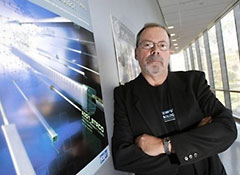News
Open Access Advocate Philip E. Bourne to Receive 2009 Benjamin Franklin Award
Published April 27, 2009

|
Bourne will receive the award on Tuesday, April 28, at the annual meeting of the Bioinformatics Organization in Boston. Established in 1998 to host collaborations in bioinformatics and promote open access to biological information, the organization's annual award recognizes an individual for promoting free and open access to materials and methods used in the life sciences, as envisioned by the 18th century scientist and statesman for which it is named.
"Dr. Bourne is well known in the field, and particularly well known for his contributions in open source and open access bioinformatics," said Bioinformatics Organization President J.W. Bizzaro, who will present Bourne with the award this week. "In particular, his work with the SciVee project is just one example of his many contributions in so many areas. He stands out as one of the more prolific laureates so far."
Bourne is co-founder of SciVee, the Web 2.0 resource dedicated to the dissemination of scientific research and science-specific research networking. Launched in late 2007 as a collaboration between the National Science Foundation and the San Diego Supercomputer Center (SDSC) at UC San Diego, SciVee has been used by hundreds of thousands of students and professional scientists as a means of learning and sharing their research through online science videos that supplement peer-reviewed journal articles, stimulate discussion, and promote collaboration. SciVee earlier this month announced a number of significant upgrades to its site, along with the addition of 32 new science categories.
"Clearly, open access is the best way that leads to new ways of disseminating and comprehending science, and that is what projects like SciVee are all about," said Bourne, Director of Structural Bioinformatics and an SDSC Distinguished Scientist, and a professor with the Skaggs School of Pharmacy and Pharmaceutical Sciences at UC San Diego.
Bourne is also an academic participant in the California Institute for Telecommunications and Information Technology (Calit2), which has contributed hundreds of hours of science-related video programming to SciVee.
"Phil Bourne had this great idea of creating a YouTube for science, and we have been strongly supportive because SciVee fills a real need among researchers to share their findings and pass along that knowledge to students who grew up with the Internet," said Ramesh Rao, director of the UC San Diego division of Calit2 and a professor in the university's Jacobs School of Engineering. "SciVee is particularly attractive to Calit2 because it uses new media in an innovative manner to deepen understanding of technical content."
But while the Internet has in recent years become a vital tool in reaching new audiences on an unprecedented scale, having full and unfettered access to important scientific research is still a different matter in many cases. "When things are highly restricted or copyrighted, the free flow of information is simply not there," he said.
The nomination committee for the 2009 Benjamin Franklin Award also recognized Bourne for his open-access work with the Protein Data Bank (PDB) and the Public Library of Science (PLoS), said Bizzaro. As associate director, Bourne helped the PDB - the single worldwide, open-access repository for three-dimensional structures of large molecules and nucleic acids - reach more than 170,000 unique users per month, with more than 57,000 molecule structures archived to date. The RCSB PDB is jointly managed by Rutgers University, under director Helen M. Berman, and the Skaggs School of Pharmacy and Pharmaceutical Sciences at UC San Diego, with SDSC serving as the primary FTP site for users.
Bourne's research focus is on relevant biological and educational outcomes derived from computational science and scholarly communication, employing algorithms, text mining, machine learning, meta-languages, biological databases, and visualization to advance discovery in drug effects, evolution, cell signaling, apoptosis, and systems biology. He is also a founding editor-in-chief of the journal PLoS Computational Biology, part of the Public Library of Science, a nonprofit organization of scientists and physicians committed to making the world's scientific and medical literature a public resource.
Bourne received his doctorate from the Flinders University, South Australia, in 1980. His other recent awards include the Flinders University Convocation Medal for Outstanding Achievement (2004), and the Sun Microsystems Convergence Award (2002).
Media Contacts:
Jan Zverina, SDSC Communications, 858 534-5111 or
jzverina@sdsc.edu
Warren R. Froelich, SDSC Communications, 858 822-3622 or
froelich@sdsc.edu
Categories
Archive
Related Links
San Diego Supercomputer Center: http://sdsc.edu
SciVee site: http://www.scivee.tv
Bioinformatics Organization: http://www.bioinformatics.org
RCSB Protein Data Bank: http://www.pdb.org
Calit2: http://www.calit2.net
UC San Diego: http://www.ucsd.edu

